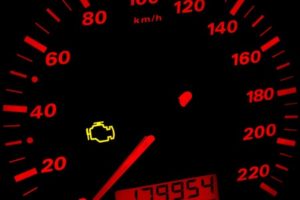If you’ve noticed your car idling roughly in conjunction with an illuminated ‘check engine light’, you may be concerned with the health of your vehicle. It’s true that there are many potential reasons for these symptoms, one of which is the Positive Crankcase Ventilation (PCV) valve in your engine. But what is a PCV valve? And how do you know if yours has gone bad?
First, What Is Your PCV Valve?
Your PCV valve is part of your emissions system. It is located in your engine valve cover and is connected to the intake manifold.
Its job is effectively to give your engine a second chance to burn gases, increasing efficiency and reducing emissions. It also helps regulate the pressure in your crankcase and helps minimize the development of sludge in your oil.
Your PCV valve also helps protect your engine if and when it backfires by closing shut and keeping the backfire from reaching the engine crankcase.
Has Your PCV Valve Gone Bad?
There are several hallmark symptoms of a bad PCV valve. Since many of these symptoms overlap with other engine troubles, you can save a lot of time and hassle by visiting your local mechanic, who can quickly evaluate your vehicle and diagnose the root of your car’s woes.
1.Your check engine light is on
A PCV valve that’s either stuck in the open or closed position can trigger your check engine light. This happens when your vehicle’s computer detects a problem with the air-fuel mixture, whether it’s too rich (your PCV valve is stuck closed and too much fuel is in the system) or too lean (your PCV valve is stuck open and there’s too much air in the system).
2. Your car is idling roughly
If your PCV valve is stuck open, too much air will enter the engine. This means that the air-fuel mixture is too ‘lean’, resulting in a rough idle. In some cases, your car may also stall.
3. There’s a buildup of sludge in your engine

Sludge may sound like something you would never find in a car, but it’s a real problem inside of your engine that can cause costly repairs. Sludge is a semi-solid substance that’s made of oxidized engine oil, dirt, and other substances that can cause many different problems with your car.
How does the PCV valve factor into this? If this component isn’t working properly, it can allow blowby (leaking combustion gases) to mix with your engine oil. This combination creates that thick and gooey substance known as sludge that can clog and damage your engine.
4. Your car is slow to accelerate
If your PCV valve is stuck in the open position, the resulting ‘lean’ air-fuel mixture can make it difficult for your car to accelerate. Sometimes, this problem can also make it difficult to start your car.
5. Your car is leaking oil

As mentioned above, your PCV valve helps regulate the pressure in the crankcase.
If it’s stuck closed or clogged, it will throw off the balance, forcing oil through gaskets, seals, the air cleaner assembly, and onto your garage floor.
6. Your fuel efficiency isn’t what it used to be
A PCV valve that is stuck in the closed position can allow too much fuel into your engine, resulting in a ‘rich’ mixture. The end result is fewer miles per gallon and more trips to the gas station.
Can It Be Fixed?
The only way to fix a broken PCV valve is to replace it. For the intrepid, you can pull out and replace the faulty part on your own unless your PCV is built into your valve cover. In these cases, the entire assembly must be replaced. T3 Atlanta can help. With over 20 years experience repairing Nissan, Lexus, Toyota, and Infiniti vehicles, we’ll get you back on the road in no time. Give us a call at one of our two convenient Metro Atlanta locations today!











Leave a Reply
You must be logged in to post a comment.